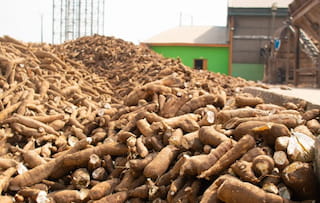Podcast: Can the block farming model help us make progress towards food systems transformation?

Africa is the largest producer of cassava in the world. Yet, internationally, Africa does not feature in the USD 2.8 billion Cassava trade. An imbalanced supply-demand relationship between smallholder farmers, primary processors, and industrial food producers is one of the causes.
Seasonal fluctuation in farm productivity meant processing factories cannot rely on a sufficient, regular supply of cassava when there is demand, and so are forced to operate below capacity. In turn, industrial food manufacturers cannot contract local processors given the inconsistency in the production of cassava derivatives of the right quality. This creates a regular demand-supply deficit, which has resulted in the shutdown of several cassava processing factories in Nigeria and other parts of Africa.
In the cassava industry in Nigeria, the ‘Block Farming Model’ reimagines the traditional supply-demand relationship, supporting more reliable sourcing of cassava roots to processing factories. With the model, IDH aims to streamline the supply – demand dynamics in the industrial cassava sector and increase farming production, in order to ensure that agricultural value chains are economically viable, inclusive, and resilient.
Listen to the latest AGRF podcast episode which speaks with Cyril Ugwu, the IDH Country Director Nigeria, on what this model has achieved so far and the opportunities this brings to make progress towards zero hunger in Africa.
Interested in reading more about transforming African food systems? Click here.